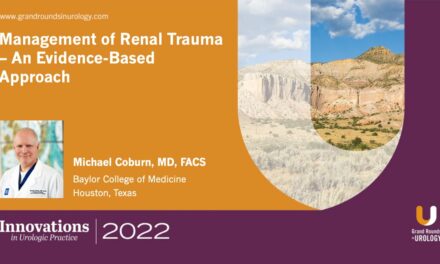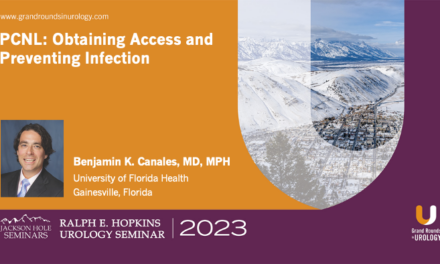Michael Coburn, MD, FACS, presented “Management of Kidney Injuries: An Evidence-Based Approach” at the 28th Annual Innovations in Urologic Practice on September 15th, 2024.
How to cite: Coburn, Michael. “Management of Kidney Injuries: An Evidence-Based Approach” September 2024. Accessed Jan 2025 . https://grandroundsinurology.com/management-of-renal-trauma-an-evidence-based-approach/
Management of Kidney Injuries: An Evidence-Based Approach – Summary
Michael Coburn, MD, FACS, delves into the complexities of kidney trauma management, emphasizing the challenges associated with limited high-level evidence and reliance on expert consensus.
In this 26-minute presentation, Coburn reflects on decades of experience in urologic trauma. Guidelines for trauma have seen revisions, with updates in 2017 and 2020 by the AUA and more forthcoming. He sees a shift towards non-surgical management in hemodynamically stable patients, reflecting a growing emphasis on observation rather than immediate intervention. He shares images illustrating different levels of renal injury.
Coburn relates that follow-up imaging is advised for high-grade injuries to monitor for hematoma expansion, potentially preventing severe complications. Angioembolization has emerged as a valuable tool for controlling bleeding in stable patients, reducing the need for nephrectomy. Specific injuries, such as pseudoaneurysms, often require immediate embolization, while surgical intervention is recommended when substantial kidney tissue is damaged.
Pediatric injuries are highlighted for their unique management needs. Coburn’s presentation concludes with a call for careful patient selection, especially in cases of severe vascular trauma or concomitant visceral injuries, where early intervention can mitigate future complications.
About The 26th Annual Innovations in Urologic Practice:
Presented by co-chairs Mohit Khera, MD, MBA, MPH, and Michael Coburn, MD, FACS, the Innovations in Urologic Practice conference provides a detailed review and commentary on multiple genitourinary and urologic diseases. Among the featured oncological topics are bladder cancer and immunotherapies, as well as upper tract cancer management, prostate cancer, including state-of-the-art imaging, focal therapy, and MRI. Experts also discuss new tools and techniques for nephrectomy and treating advanced renal cell carcinoma. In terms of general urological approaches, the conference also includes pelvic reconstruction and trauma; men’s health topics like male infertility, andrology, and sexual dysfunction; OAB and voiding dysfunctions; and ways to diagnose and treat infections in the urology patient.
For further educational activities from this conference, visit our collection page.
ABOUT THE AUTHOR
Michael Coburn, MD, FACS, is Professor and Chairman of the Scott Department of Urology at Baylor College of Medicine in Houston, Texas. Dr. Coburn is a graduate of Cornell University in Ithaca, New York, and he earned his medical degree in 1982 from New York University School of Medicine. He completed an internship and his residency at Baylor College of Medicine and then pursued fellowship training at Baylor as an American Foundation for Urologic Disease Scholar.
Dr. Coburn served as Chief of Urology at Ben Taub Hospital from 1990 until 2012, focusing his clinical and research interests in the areas of urologic trauma, genital and urethral reconstructive surgery, and sexual and reproductive dysfunction.
He was the urology representative on the American College of Surgeons Committee on Trauma, where he served as chair of the Advocacy & Health Policy Committee and a member of the Executive Committee from 2014-2020. Dr. Coburn is a past president of the Society of Genito-Urinary Reconstructive Surgeons and is a former chair of the Accreditation Council for Graduate Medical Education (ACGME) Residency Review Committee for urology. He currently serves as Vice President of Education at Baylor’s St. Luke’s Medical Center in Houston, Texas.
Dr. Coburn is the recipient of many awards for his educational and clinical work, including the Robertson Presidential Educator Award for lifetime achievement in educational leadership at Baylor College of Medicine.


